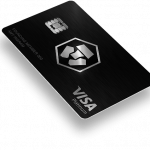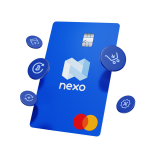Best Crypto Debit Cards for 2024


Best Overall Crypto Debit Card
Coinbase: great for customers who need a user-friendly option backed by the leading U.S. crypto exchange.
Read our review

Top Crypto Debit Card for Rewards
Crypto.com: great for customers who want access to various cryptocurrencies and an excellent reward structure.
Read our review
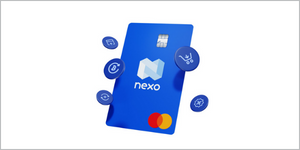
Top Crypto Debit Card for Low Fees
Nexo: the Nexo Card gives users access to a crypto lending ecosystem that provides cash-back benefits with no annual fees
Read our review
Crypto debit cards are on the rise. Linked to your cryptocurrency holdings rather than a traditional bank account, these cards can provide an easy way to spend crypto, anywhere you use a debit card.
There are many different crypto debit card options, with varying levels of security, spending rewards, and supported tokens.
There are also important considerations for investors: most debit cards convert your crypto into another token behind the scenes, which can cause tax problems and investing headaches.
Based on reliability and user reviews, we’ll show you our top picks for the best crypto debit cards, rated and reviewed by our editors.
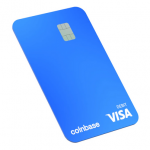 Crypto Debit Cards: Our Top Picks
Crypto Debit Cards: Our Top Picks
Coinbase
Brian Armstrong and Fred Ehrsam founded Coinbase on June 1, 2012, and since then, it’s grown to become one of the world’s largest and most respected crypto companies. (See our piece on How to Invest in Coinbase.)
The company’s crypto debit card allows cardholders to spend cryptocurrencies like bitcoin (BTC) and Ethereum (ETH) anywhere Visa debit cards are accepted at 40M+ merchants worldwide.
The card highlights no fees for transactions or annual memberships. A simple rewards-earning structure is capped only by spending limits, and users can check their monthly allotment on the Coinbase App.
What makes the card especially appealing is that it is tied to one of the largest crypto exchanges in the world. The debit card links to your Coinbase account; all withdrawals come from there.
To get started, you just need to open a Coinbase account or download the app, load it up with crypto, and then request a debit card.
Pros:
- World-class security from a trusted crypto exchange.
- Contactless payments.
- Rewards and cashback.
- 250 crypto assets supported.
- No annual fees.
Cons:
- Unless you are using USDC, a 2.49% fee is charged to convert your crypto into dollars.
- Users need a Coinbase account.
- KYC required.
Conclusion: The Coinbase debit card is good for customers who need a user-friendly option backed by the leading U.S. crypto exchange.
 Wirex Debit Card
Wirex Debit Card
Wirex is a UK-based company offering crypto debit cards for personal and business use. The company provides you with a contactless card and an app to manage it.
Wirex’s main product, the Wirex Visa card, allows you to convert between fiat currencies and cryptocurrency and use either at locations accepting contactless payments.
The card provides generous rewards, and many consider it among the best for consumer perks, like Wirex X-tras, which gives up to 8% crypto cashback in the form of WXT tokens, a 12% savings bonus on the balance of your WXT account, and access to exclusive merchant offers.
The Wirex debit card has additional benefits, including a wide range of cryptocurrencies and free or low fees, like free ATM withdrawals up to $200 per month, then 2% after that.
Wirex also offers the X-Tras program, a subscription service starting at €9.99 that offers bonuses for participants that include increased rewards (starting at 3%), savings bonuses, and interest-earning accounts.
Pros:
- No monthly maintenance fees.
- Cashback rewards.
- 41 crypto assets supported.
- Widely available globally.
- Easy to use.
- Free ATM withdrawals up to $200 per month.
Cons:
- Rewards only come through the X-Tras program, which could outweigh the benefits.
- Limited availability, primarily in Europe and the Asia Pacific regions.
- You need Wirex tokens, the company’s in-house crypto asset, to get the best rewards.
Conclusion: The Wirex debit card is good for customers who want a low-fee card and easy access to a wide range of currencies and fiat — if available in your country.
BitPay Debit Card
BitPay is an American company that provides bitcoin merchant processing services. It also offers bitcoin payment processing solutions to businesses.
With 15 supported cryptocurrencies, the BitPay Debit Card can process domestic and international transactions with cryptocurrency, so long as the processor accepts Mastercard.
BitPay offers cashback rewards with over 100,000 merchants; rewards vary depending on the merchant.
Its crypto debit card links to your wallet through the BitPay app. You can then top up your crypto debit card via the app to convert your crypto and start spending. You can also top up the card from your Coinbase account.
As of February 2024, there is a waitlist for the BitPay card, and the firm has paused applications while improving the service. Once they begin accepting new users, you can download the app, set up the wallet, and order your debit card to get started.
Pros:
- No exchange or conversion fees in the U.S.
- No annual fees. $2.50 ATM withdrawal fees apply.
- No withdrawal limits.
Cons:
- Limited to the United States.
- Deposited crypto is exchanged for USD and cannot be converted back.
- Only 15 cryptos are supported.
- 3% foreign transaction fee.
Conclusion: The BitPay debit card is good for U.S. residents who don’t want to pay exchange fees and are happy with a limited range of cryptocurrencies.
Crypto.com Debit Card
Crypto.com is a Hong Kong-based crypto exchange platform providing bitcoin debit cards, cryptocurrency wallets, and other products. They currently offer several cards, including the Obsidian card covered here.
The Crypto.com debit card uses Crypto.com’s Cronos (CRO) token. Funds added to the card are converted to CRO, and that token must be staked to earn cashback rewards – which are also paid out in CRO. Be sure you research CRO before investing in this token; Crypto.com has aggressively marketed its brand, but the price is volatile.
On top of its long list of benefits, the Crypto.com debit card also offers monthly reimbursement of up to one subscription per merchant or 10% of a specified limit to Spotify, Netflix, Amazon Prime, Expedia, and AirBnB.
The card allows you to spend your cryptocurrencies anywhere in the world that Visa is accepted.
Pros:
- Up to 5% rewards on the top-tier Obsidian card.
- No annual fees or monthly rewards cap.
- 110+ cryptocurrencies available for topping up.
- Several subscription benefits with services like Netflix, Amazon Prime, Spotify, and more.
Cons:
- 2% withdrawal fee past monthly ATM limits (limits range from $200 to $1,000, depending on the card).
- 3% on all non-USD purchases and ATM withdrawals for all tiers except Obsidian
- Cardholders must hold Crypto’s CRO tokens. (See historical price here.)
Conclusion: The Crypto.com debit card is good for customers who want access to various cryptocurrencies and cards with various rewards, but be careful about holding CRO long-term.
Nexo Debit Card
The Nexo Card is provided by Nexo, a crypto lending service that has grown into a large ecosystem that comprises exchange operations and a proprietary wallet and card. You can manage the card conveniently from the Nexo Wallet App.
Unlike other debit cards, there is no need to load the Nexo card. Instead, it uses a line of credit linked to your held cryptocurrencies. You can opt for APR repayments as low as 0% or increase your line of credit with rates as high as 13.9%. The line of credit functionality means that, unlike credit cards, there are no minimum monthly payments.
Nexo users can pay with the Visa-based card at over 40 million merchants worldwide. In addition, it supports up to 20 cryptocurrencies, including bitcoin, Ethereum, and NEXO (the platform’s native token).
With the card, Nexo provides a €10,000 limit for foreign transaction fees and five free ATM withdrawals of up to €10,000 each month. Additional withdrawals are charged €1.99 per transaction.
The great thing about the card is that it has no annual or inactivity fees. Interest rates on debit card mode reach 14% interest with NEXO tokens. You have to download the app and order the card to get started. Make sure to have Apple Pay or Google Pay ready to settle your outstanding totals quickly.
Pros:
- There is no annual or inactivity fees.
- Rewards and interest are generous, as are the ATM and international transaction limits.
- 14% daily compound interest with NEXO tokens.
Cons:
- Limited to the users on the Nexo system.
- Only available to residents of the European Economic Area (EEA).
Conclusion: For European consumers, the Nexo Card gives users access to a crypto lending ecosystem that provides cash-back benefits with no annual fees.
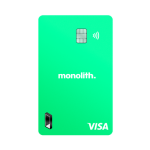 Monolith
Monolith
Monolith is a specialized crypto debit card focusing on the Ethereum ecosystem. The Visa debit card allows users to exchange fiat for Ethereum-based tokens and load them onto the card. Real-time spending analytics and card information can be managed via the Monolith application.
It also has some limitations–for example, unless you’re using TKN, card top-ups made with this card are subject to 1% top-up fees.
This debit card is only available in the United Kingdom, the European Economic Area, and other Special Member State Territories, such as French Guiana, Gibraltar, and Guadeloupe.
Pros:
- Can be used anywhere a Visa card is accepted.
- Low ATM withdrawal fees.
- Based entirely on Ethereum.
Cons:
- Not currently available in the United States.
- Only works with Ethereum-based tokens.
- 1% fees for topping off with non-TKN crypto.
- 1.75% fees for making international purchases.
- No benefits or rewards.
Conclusion: The Monolith Visa Card could be the right option for someone based in Europe and the UK primarily interested in the Ethereum network.
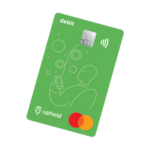 Uphold
Uphold
The Uphold Debit Card is a product of Uphold, a digital money platform providing a wide range of financial services that span crypto trading, storage, and day-to-day transactions. Since 2015, the company has powered more than $4+ billion in transactions.
Their debit card is designed to be accessible and flexible. Users can enjoy traveling abroad without worrying about hidden costs with 0% foreign transaction fees and low FX rates. On top of that, users can also keep their payment processes secure by incorporating their Uphold card with Apple Pay and Google Pay.
The downsides to the card would be the £9.95 fee to order the physical card and the ATM withdrawal fees of up to £3.50.
Pros:
- Support for over 250+ cryptocurrencies
- 0% foreign transaction fees
- 1% cashback paid in GBP
Cons:
- Only available to UK users
- £9.95 ordering fee
- £2.50 fee for national ATM withdrawals and £3.50 for foreign withdrawals.
Conclusion: While the rewards system leaves something to be desired, the low foreign transaction fees make this card perfect for crypto users on the go.
 Choise Crypterium
Choise Crypterium
The Choise Crypterium card is a crypto wallet and VISA card in virtual and plastic formats. The Choise card is provided by Choise.com, a company aiming to gather multiple DeFi and TradFi banking solutions under a single marketplace.
The Choise card does not offer a compelling rewards program. Instead, it focuses on providing its users with high-level compliance and security protocols. The company uses certified custodians, Layer-3 security measures, and offers up to $150M in insurance against loss or theft.
Pros:
- Layer-3 security protocol.
- EU compliant since 2017.
- BTC, ETH, and 30+ cryptocurrencies supported.
- Withdraw up to €2,500/mo from ATMs in 200+ countries.
Cons:
- Only available to UK users.
- KYC Required.
- Monthly fee of €2.99. Users with €299 or greater will have this fee refunded in the form of CRPT.
Conclusion: This card is perfect for those who may be on the fence about the crypto ecosystem. Uphold is compliant with all EU virtual asset operation regulations.
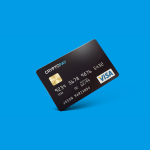 Cryptopay
Cryptopay
The Cryptopay Debit Card is a Visa prepaid card that allows users to make purchases or withdraw cash by converting their cryptocurrency into fiat. The card is provided by Cryptopay, a comprehensive crypto service offering a user-friendly solution for individuals and businesses to bridge the gap between traditional financial systems and the emerging digital ecosystem.
The Cryptopay Debit Card can convert 30 crypto assets into fiat, highlighting a low monthly fee of $1 and no transaction fees for purchases in the card’s currency.
Pros:
- Access to 30+ crypto assets.
- Pay anywhere Visa is accepted.
- Maximum single spend of €30,000.
Cons:
- No rewards program.
- Limited to 5 ATM transactions per day.
- 3% foreign transaction fee.
- Limits to withdrawing crypto outside Cryptopay.
Conclusion: The Cryptopay debit card is great for those looking for an everyday carry item, with low monthly fees and no transaction fees for purchases in the card’s currency.
If you’re looking for a more visual breakdown of the best crypto debit cards for you, check out this video from Minted Max:
What is a Crypto Debit Card?
Crypto debit cards (sometimes called bitcoin debit cards) allow you to spend your crypto assets in the real world like a standard debit card.
These cards work following some basic steps:
- They link to a crypto wallet or online account where you hold your bitcoin or other crypto assets (like the Coinbase card).
- They convert your fiat to their token that’s held on the card until you use it for payment (like the Crypto.com card).
- When you use either card to purchase, your crypto is converted to fiat currency before the merchant processes it.
These debit cards let you quickly spend your crypto assets like cash. And, unlike crypto credit cards, you are not spending money you don’t have: think of these as prepaid or gift cards loaded with crypto instead of cash.
Note that a crypto debit card is different from a crypto credit card. Be sure to check out our article on the best crypto credit cards.
Crypto Debit Cards vs. Crypto Credit Cards
Here’s a quick breakdown of the differences between a crypto debit card and a crypto credit card.
Why Use Crypto Debit Cards?
Crypto debit cards offer an array of benefits that include:
- Flexibility: With crypto debit cards, users can spend their cryptocurrency in real-world scenarios, even at places that traditionally don’t accept cryptocurrency.
- Convenience: Handing a debit card is more convenient than fumbling for cash or checking your pockets for direct change. Because they draw funds directly from a wallet, transactions are processed quicker than a credit card.
- Push for adoption: Using crypto debit cards helps promote the mainstream adoption of cryptocurrencies. If more institutions were to adopt crypto, your coins would be worth more.
Tips for Choosing a Crypto Debit Card
There’s no perfect crypto debit card; only the right one for you. Consider these factors when choosing a card that matches your spending patterns, lifestyle, and choice of cryptocurrency.
- Know the Supported Cryptocurrencies: Not all crypto debit cards support every cryptocurrency. Make sure to double-check that your card supports the specific crypto you own.
- Understand the Fees: Fees can quickly eat into your funds if you use your card often. Before applying for a debit card, examine its fee structure. Cover the basics and be aware of all associated costs. Also, understand your debit card’s annual, transaction, withdrawal, and conversion fees. Some cards operate with a native token, which might offer holders lower fees if they choose to stake.
- Geographical Availability: With crypto regulation varying heavily between countries, you should check if your card is accepted in the regions you plan to frequent. Country-specific restrictions also apply online, so check if the card can be used for online and physical merchants.
- Consider Staking or Holding Requirements: If you want to maximize your crypto debit card, check out if they offer enhanced rewards or reduced fees if you stake a certain amount of the provider’s native cryptocurrency. Some cards even require you to stake with their native token to use the card at all.
- Optimize Rewards and Benefits: Optimizing for cashback rewards programs and incentives can add significant value to your transactions. Make sure to compare different rewards programs from the cards, comparing the percentage of cashback, how rewards are paid out, and if certain conditions are required to earn the maximum reward.
Investor Takeaway
Just as people use credit cards for everyday purchases to earn reward points (travel rewards, cashback rewards, etc.), crypto investors can use crypto debit cards to earn rewards.
In addition to the fees of transferring your fiat into crypto (the “on-ramp”), think about the costs of opening the card, loading the card, and using the card (the “off-ramp”).
Before opening any crypto debit card, do a back-of-the-envelope calculation to figure out your average monthly spend and all the fees that will be associated with it – be sure the rewards outweigh the costs.
Additionally, crypto debit cards pull directly from your account, and crypto debit cards convert your crypto into their native token.
For more smart crypto investing tips, don’t forget to sign up for our free crypto investing newsletter.

